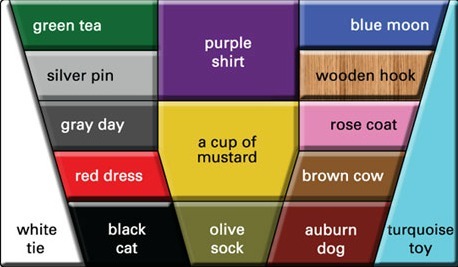Dear Students,
One of the projects that I usually do in my Phonetics courses, especially if the quarter happens to be the last quarter of the year is the: Sound Costume. I have generally asked my students to represent a Consonant Sound, but this time, as I am teaching Phonetics 2, I am asking you to represent a vowel sound.
Remember that you have to:
1. Select a vowel sound.
2. Think of a character / Costume that could represent the sound. For example: Black Cat.
3. Create a slogan of 3-5 lines for your character using mainly words with the vowel sound. For example: I am a Black Cat. I have a hat. I killed rats... etc". Try to use as many words as you can.
4. Be creative and original.
Here are some of my former students pictures (hopefully, they don't mind I post their pictures here)
Please write your comments and questions on the comment section below.
See you in class!
Prof. Ramos
Mastering English Phonetics and Pronunciation
Tuesday, October 21, 2014
Tuesday, September 30, 2014
The Color Vowel Chart
Dear Students,
I hope that you have liked the Color Vowel Chart workshop we had last class. The color vowel chart was created by Karen Taylor & Shirley Thompsom.
Here is their official website.
I think the Color Vowel chart is a valuable resource to master American English vowels. Some other useful resources for you to improve your pronunciation of English vowels are:
1. University of Iowa: "Phonetics: The Sounds of American English".
2. Here is a useful video by the creators of the Color Vowel Chart.
3. Here is also an interesting video about the differences in vowels between American English and British English.
What do you think of this last video? What vowels are the most difficult to pronounce for you? Remember to write your comments here in the Post a comment section.
See you in class!
Miss Ramos
I hope that you have liked the Color Vowel Chart workshop we had last class. The color vowel chart was created by Karen Taylor & Shirley Thompsom.
Here is their official website.
I think the Color Vowel chart is a valuable resource to master American English vowels. Some other useful resources for you to improve your pronunciation of English vowels are:
1. University of Iowa: "Phonetics: The Sounds of American English".
2. Here is a useful video by the creators of the Color Vowel Chart.
See you in class!
Miss Ramos
Wednesday, September 3, 2014
What is Phonetics?
You can find many definitions of what is phonetics, and it is really hard to decide which one is the best. That’s why I chose six definitions that in their particular way address important aspects of what is phonetics and what studying phonetics involves.
Here they are:
Here they are:
- Phonetics is the study of the articulatory and acoustic properties of the sounds of human language.
- The branch of linguistics that deals with the sounds of speech and their production, combination, description, and representation by written symbols.
- The system of sounds of a particular language.
- Phonetics (from the Greek: φωνή, phōnē, “sound, voice”) is a branch oflinguistics that comprises the study of the sounds of human speech.[1] It is concerned with the physical properties of speech sounds (phones): their physiological production, acoustic properties, auditory perception, and neurophysiological status.
- The study of speech sounds, their production and combination, and their representation by written symbols.
- The description and analysis of the sounds of a particular language.
Now you have an idea what is phonetics. Now, I encourage you to write a paragraph about what do you think learning Phonetics is important for you as a B.A. in English student? Just click on the post a comment section.
Welcome to Phonetics 2
Hello!

Welcome to our Phonetics Class Blog, a space where I would like to give you the opportunity to find useful material to learn about English Phonetics and improve your pronunciation.
Let me tell you a short story about how I started teaching Phonetics. Some years ago, I was asked to teach my first phonetics course, I was thrilled to share with my students a subject that I thought was going to be fun and easy. Unfortunately, I was totally wrong. My students that quarter struggled a lot to master the main phonetic concepts, there were times when I sensed that they could not understand what I was talking about. I felt even worse when most of my students failed their first mid-term. I have to be honest, I felt like a complete failure as a teacher. How was that possible? I tried really hard to teach them the best I could. I really couldn’t believe it.
One day, I decided to make some changes, used different strategies that might help them to learn phonetics and enjoy the learning process. I spent a lot of time online trying to find things that have proven to be successful with other teachers, or things that even though were not closely related to phonetics may be useful. Thank God, my new approach was a success!!! My students began learning the concepts, and even enjoyed the subject. I felt so proud of them, and I felt relieved.
Right now, I am teaching Phonetics again, and I would like to have an online space where my you can come and practice, even from home. I hope that you find the experience relevant and useful for the improvement of your English language skills.
Bye for now,
Miss Ramos
Subscribe to:
Posts (Atom)




